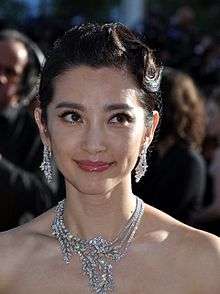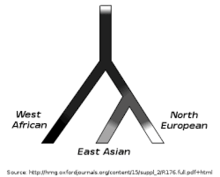Chinese ideals of female beauty

In Chinese contemporary popular culture, there are various aspects to the female beauty ideal.
History
The emphasis that both Taoist and Confucian notions of female beauty place on the relationship between inner and outer beauty has influenced the creation of the Chinese female beauty ideal. To further see the history of this culture, as well as how these ideals came into place see Chinese Culture.Outer beauty was thought to represent virtuousness, talent, and other positive characteristics.
In Taoist thought, women with masculine voices make poor sexual partners, because this trait suggests an excess of ch'i that inhibits the attainment of sexual harmony. In her article “Female Bodily Aesthetics, Politics, and Feminine Ideals of Beauty,” Eva Kit Wah Man articulates how Confucianism and Taoism played essential roles in the creation of Chinese beauty ideals: “In the Chinese tradition, as in other cultures, both the external sexual and inner moral dimensions determine the beauty of a woman…The notion of female beauty comes from both (Taoism and Confucianism).” "Femininity" does not refer to an aspect of a dichotomy between mind and body, as there is no such dichotomy in Chinese philosophy. Women in China also expands on these ideals, delving into the impact women have in Chinese society.[1] Thus, historically, the religious influences on Chinese beauty ideals closely tied outer beauty to inner beauty.
Modern Chinese society is highly influenced by Western capitalist and Marxist thoughts. The Chinese would not describe themselves as a completely Capitalist country, nor a purely Marxist country. They fundamentally ignore this type of question about the essence of its political position, and develop their economy, politics, culture and feminism in their own way. They call themselves a socialist market economy with Chinese characteristics. The rise of Chinese feminist development is highly influenced by the claims of the “new “ China (since the early 19th century) and its government that it would save the Chinese woman from the “old society” and set women’s minds free (Chun, 2008). An article published in the widely circulated journal Dushu uses an earlier nativist satire to argue that women themselves voluntarily desired the beauty of small feet (footbinding) into the first decades of the twentieth century, despite the elite, male-dominated discourse of liberation and equality that assailed the practice.[2]
Cultural Ideas on Women's Beauty
Chinese culture greatly values the appearance of women. This is evidenced in the business environment alike with the social environment. John Osburg, Director of Anthropology at the University of Rochester in his book, Anxious Wealth, explores the gender relations in Post Mao China, documenting the well-known disparity that exists between men and women. A theme of his work is that the objectification of women as a commonplace in Chinese culture creates the gender inequalities that are still prevalent today. “The vast majority of entrepreneurs in post-Mao China are men. This is largely due to the fact that business networking requires entering spaces (such as nightclubs and saunas) and participating in activities (drinking, gambling, and sex consumption) that are not viewed as appropriate for “proper” women….these networks constitute a key component of business…the bulk of the relationships of these networks are forged and maintained through ritualized leisure-experiences of shared pleasures catering to the desires and enjoyments of elite men, including karaoke clubs, saunas, nightclubs, high-end restaurants, and teahouses.[3]” This is a culture with the intent of pleasing the men. As Osburg details, the karaoke clubs, saunas, nightclubs, etc. are meant to attract the businessmen, as there are also multiple red light districts around these areas. Prostitution in China further expands on these areas and this culture. In many cases, relationships between employees, co-workers, partners, etc. are forged through these settings. Based on these traditional practices, it can be stated that it is of utmost importance then for the women to be aesthetically pleasing, further highlighting women’s attempt to capture beauty, or at least capture the way it is perceived by Chinese Culture.
Hair
Advertising offers insight into the Chinese conception of beautiful hair. As of 2004, the consumption of cosmetics and hair products in China had grown over the past twenty years from 25 million US dollars to 6 billion US dollars, and brands are eager to advertise their products to the growing market.[4]
Contemporary sinophone shampoo commercials aimed at female consumers typically portray the same beauty ideal when it comes to hair: long, shiny, dark, and sleek. The thirty second clips usually feature a solitary model with a thick, glistening mane. She may be engaged in any activity – simply lounging around the house or, as in the case of one commercial, jumping out of an airplane – and her hair is in constant motion. The commercials characterize the model’s animated and lively hair as strong, shiny, long, and soft. Often, a male gaze on the model sexualizes and eroticizes the hairstyle. Sometimes a male character appears, usually to approve of or admire the gorgeous hair the product had created, but often the male gaze is implied.
Double Eyelid
In recent years there has been a large movement amongst Chinese women towards many western appearance norms. One part of this movement is the phenomenon of embodying the aesthetic of Western beauty.[5] Western-like deep-sculptured faces, especially the “double eyelid,” are unconditionally considered beautiful.[5] The "double eyelid" is a crease in the small flap of skin that covers the eye. It has been estimated that 40-60% of Asians lack this upper eyelid crease, giving them a “single eyelid” appearance.[6] However, this is not ideal when it comes to Chinese beauty.
A study looked at which type of eyelid was considered most attractive on Chinese women. Edited photographs of young Chinese women’s eyes were presented to the test participants. It found that there was significant preference for the “double eyelid” while the “single eyelid” was considered to be the least attractive.[7] Because of this, many Chinese women go through a surgery that creates a fold in the upper eyelid giving them the “double eyelid”. This procedure, called blepharoplasty, typically costs around $3,000.[8] During this 30 minute surgery, doctors cut, fold, and stitch the upper eyelids, creating a small crease above the eyelids.[9] This operation makes the eye appear larger and more round, giving the woman a westernized look.
https://www.youtube.com/watch?v=j0TooyLwuKE
Skin Tone
Skin tone is one aspect of Chinese beauty that is in contrast with the Western beauty ideal. In China the majority of women genetically have yellow skin. Despite this there is an obsession amongst Chinese women to have lighter skin complexion. This is far different than most Western countries which show preference in women with tan and darker skin. This beauty ideal of fair-skin dates back as early as the Han Dynasty which controlled China from 206 B.C. – 220 A.D. During this time a woman’s skin tone was known to indicate social class. Many women of lower class worked outside in the fields, exposing them to more sun, and ultimately making their skin darker. On the other hand, light skin had become a representation of social prestige and the lack of physical labor. Due to this perception, there are a lot of pressures on women in China to stay indoors and not venture outside to work or play sports such as basketball and soccer. [10][11]

Due to this obsession of obtaining fair-skin the Asia-Pacific region has become the world’s largest market for skin-whitening products. These products include various creams and pills which claim to reduce a pigment called melanin in the skin. [12] Products such as these advertise fairer-skin as “beautiful” and superior to darker skin. The downside to this is not only that it makes women of darker complexion feel inferior, but that these skin whitening products can come with many risky side effects. The active ingredient in many of these products is mercury which has been known to cause serious psychiatric, neurological, and kidney problems.
See also
- Women in the People's Republic of China
- Women in China
- Chinese Culture
- Prostitution in China
- Feminine beauty ideal
- Social influence
- Han Dynasty
- beauty
Notes
- ↑ Kit Wah Man, Eva (2000), "Female Bodily Aesthetics, Politics, and Feminine Ideals of Beauty in China", Beauty Matters, Indiana Univ Pr, pp. 169–96, ISBN 0253213754
- ↑ Chun, Lin (2008). On Feminism and China: Foot-Binding as an Aesthetic, History and Dialogue (PDF). New York. pp. 23–30.
- ↑ Osburg, John. Anxious Wealth: Money and Morality among China's New Rich.
- ↑ "Chinese New Year: cosmetics consumption in China has grown in the last 20 years from around RMB 200 million (US$25 million) to more than US$6 billion.(Trade Routes)." http://www.highbeam.com/doc/1G1-115758625.html High Beam Research. 1 Mar. 2004. 20 Apr. 2009
- 1 2 Kyo, Cho; Selden, Kyoko Iriye (2012). The Search for the Beautiful Woman : A Cultural History of Japanese and Chinese Beauty. Rowman & Littlefield Publishers. p. 224. ISBN 9781442218932.
- ↑ Li, F. C.; Ma, L. H. (2008). "Double eyelid blepharoplasty incorporating epicanthoplasty using Y-V advancement procedure". Journal of Plastic, Reconstructive & Aesthetic Surgery. 61 (8): 901–5. doi:10.1016/j.bjps.2007.05.008. PMID 17606424.
- ↑ Hwang, H. S.; Spiegel, J. H. (2014). "The effect of "single" vs "double" eyelids on the perceived attractiveness of Chinese women". Aesthetic Surgery Journal. 34 (3): 374–82. doi:10.1177/1090820X14523020. PMID 24604790.
- ↑ "What Is Eyelid Surgery?" American Society of Plastic Surgeons. 2014. Web. 26 Oct. 2016. <https://www.plasticsurgery.org/cosmetic-procedures/eyelid-surgery?sub=Eyelid%2Bsurgery%2Bcost>.
- ↑ Hays, Jeffrey. "Cosmetic Surgery in China." Home. July 2015. Web. 26 Oct. 2016. <http://factsanddetails.com/china/cat11/sub75/item136.html>.
- ↑ Adrian, Bonnie (2003). Framing the bride : globalizing beauty and romance in Taiwan's bridal industry ([Online-Ausg.] ed.). Berkeley, Calif.: University of California Press. p. 167. ISBN 9780520238343.
- ↑ Department of Asian Art. “Han Dynasty (206 B.C.–220 A.D.).” In Heilbrunn Timeline of Art History. New York: The Metropolitan Museum of Art, 2000–. http://www.metmuseum.org/toah/hd/hand/hd_hand.htm (October 2000)
- ↑ "Skin Lightening Products." WebMD. WebMD, <http://www.webmd.com/beauty/skin-lightening-products#1>.